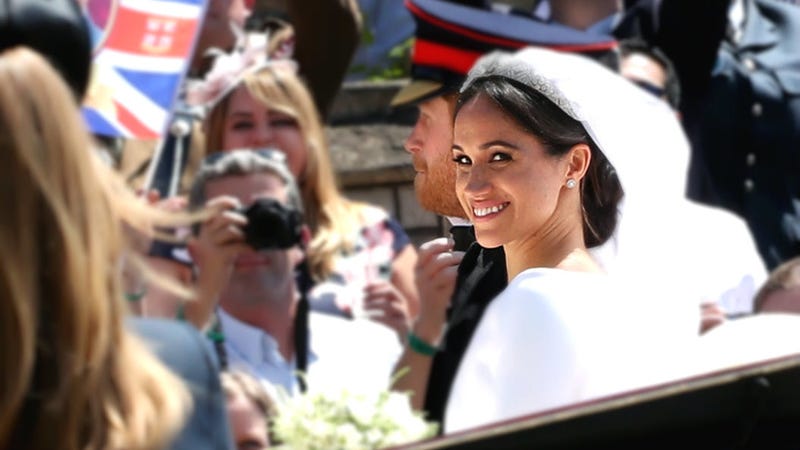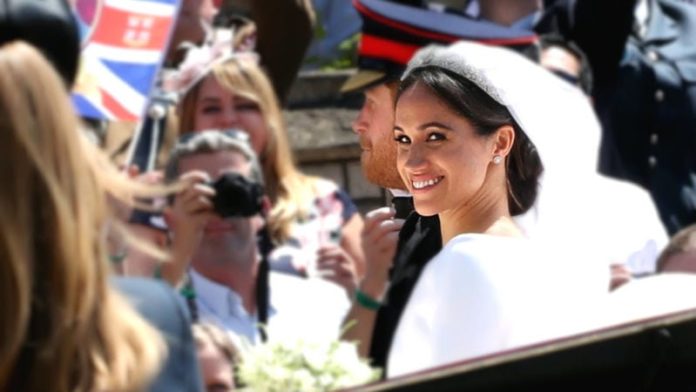
Representation matters. We’ve both heard and said it repeatedly: our visibility and presence—in every arena—is vital to our perception of ourselves and what spaces we believe we deserve to occupy, both in the world and in the scope of the human imagination.
And yet, as The Root covered the marriage of Meghan Markle into the British monarchy, repeatedly we heard some variation of any or all of the following questions:
“Why are you reporting on this? Why should we care? What does this mean for us?”
Let’s get one thing out of the way up front: we’re a black news site (don’t @ me about that fact while you’re using Al Gore’s internet; I know who I work with and to whom I report), so the question of why we’d cover the entry of a biracial American actress into the British royal family is basically asking us why we’re doing our jobs properly. (Which is a dumb question, so cut it out.)
But aside from that, contrary to Al Sharpton’s surprisingly naive opinion, no one here is under the illusion that the new Duchess of Sussex is going to change the course of white supremacy—or the long and brutal history of imperialism and colonialism that Britain has both perpetuated and passed down to its younger brother, America. If the election of the first black biracial American president only served to stoke the ire of the irrationally entitled, an interracial marriage into the British monarchy is probably not going to spontaneously inspire world peace (or solve racism, hunger or inequality), amirite?
Frankly, that’s not even a fair expectation to place upon Markle’s newly crowned head, as ending any ism remains the job of those who perpetuate it. And, as the royal family is currently more of a PR-driving figurehead than absolute British rule, it’d be a losing battle, anyway.
But with that in mind, it could be argued that the question of Meghan Markle’s relevance is only, well, a relevant question if one is predominantly concerned with the white gaze—and the white supremacy so often adjacent to it.
Fun fact: When I was a little girl, my parents refused to buy me any dolls that weren’t black because they didn’t want me to aspire to a beauty standard that didn’t include me (forget the skinny and perpetually in heels part). Accordingly, my Barbie Christie collection (which didn’t really resemble me, either, tbh) was pitifully small, which was fairly devastating to an already fashion-obsessed child.
It would take Mattel 40 years to introduce a full range of dolls that could even hope to begin to reflect the range of children (and doll enthusiasts) who want to be part of the Barbie universe. I now have a young niece who’s only just beginning to take an interest in dolls; despite my own childhood disappointment, should I not consider it progress that if and when she asks for a Barbie, I can now get her one that has a massive mane of naturally textured hair, just like her?
Meghan Markle is a living, breathing human being—a fact many seem to forget when discussing her—and while very light-complected and straight-haired, is the first black woman to be openly acknowledged by the British royal family (despite not being the first to potentially enter the royal bloodline; she’s not even the only black princess in Europe). Is that not a space we are (finally) entitled to be represented in, too?
Yesterday, those of us who were interested enough to watch (or were professionally obligated to) were given indisputable evidence that Meghan Markle knows exactly who she is, and what she represents—and clearly wanted the world to know it, too. She may have married a wealthy white man, but the question of her own identity was well-answered; not that she hasn’t answered it before, years before her engagement was announced:
Growing up in a homogeneous community in Pennsylvania, the concept of marrying an African-American woman was not on the cards for my dad. But he saw beyond what was put in front of him in that small-sized (and, perhaps, small-minded) town. … He wanted me to find my own truth.
Markle’s truth was evident in the choice of a black priest to deliver an impassioned homily at her wedding. It was evident in the gospel choir that followed. It was evident in her musical selections. And most profoundly, there was tangible evidence of Markle’s heritage in her mother, Doria Ragland, to whom Markle once wrote a deeply loving tribute on her now-defunct blog, The Tig.
From the looks of it, Markle has been clear about her identity for quite some time. And whether or not a royal wedding—or the idea of “royalty” at all—personally resonates with you, to question whether or not she “matters” is, in some ways, to question whether or not you do.
Because bottom line: Representation does matter. While I don’t personally aspire to be a princess (or know anyone who does, though I’m sure they’re out there), if only mere months ago we were collectively overjoyed to meet the fictional black princess of a country that only exists onscreen, does it really make sense to be dismissive of a real one in one of the most powerful countries in the world?
It doesn’t unless you’re really dismissive of whom she chose to marry. And that’s your prerogative; just call a thing a thing, rather than dismissing the entire affair. (I personally just shrug at people marrying folks that look like their one of their parents, but that’s me.)
As to the question of what impact Markle’s presence and story will or should have, that was perhaps best answered by British writer and broadcaster Afua Hirsch, who has been very open about her own experiences growing up biracial in Britain, and was one of many commentators who spoke to BBC America just prior to Saturday’s nuptials:
I think the challenge for the royal family is how to be a family that represents very old-fashioned values—of intergenerational inherited privilege—in a society that’s about equality of opportunity and multiculturalism. And I think that Meghan Markle is certainly someone who represents the latter; she has become successful through her own talent and hard work, she’s used her celebrity to champion causes that she’s passionate about, and also, as a woman of mixed heritage, she hasn’t shied away from speaking about that; she’s owned it.
And for me, as a black British woman of mixed heritage myself, I think there’s been a lot of pressure in my lifetime in this country—if you’re entering spaces that have previously been very white—to downplay your identity. And I think she represents a real cultural change in her willingness not to minimize it, but to speak about it. And for me, that sends a powerful signal, that you can own your identity and it’s not a taboo; it’s not something to shy away from. And that also, there is nothing essentially ‘white’ about Britishness.
You know, for a lot of people, the royal family represents a sense of British identity, and until now, that has been an identity very much linked to whiteness in many people’s perceptions. So, I think the visual and symbolic change that Meghan’s entry into that family represents is actually quite profound.




